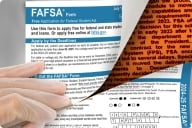You have /5 articles left.
Sign up for a free account or log in.
Perla Perez is determined to get into Delmont University. It is her dream to go there, and her parents’ dream as well. She attends Monte Verde High School, a hypercompetitive institution in California. Her friends are vying for admissions to Delmont (which is fictional), or Stanford University or a University of California campus or the Ivy League. Everyone is in Advanced Placement classes and has great SAT scores.
What happens when Perla is rejected by Delmont? That is the story of This Is Not a Personal Statement by Tracy Badua (HarperCollins). It is a new young adult novel but may be appropriate as well for those who work in admissions and related fields.
Perla is so sure that Delmont is the college for her that when she is rejected, she tells her parents and friends that she got in. And then she goes to the college in an attempt to so impress officials that she will be let in for the next semester.
It sounds far-fetched.
But Stanford in November removed a man, William Curry, from Birmingham, Ala., from the basement of a campus housing unit where had been living for 10 months, despite not being a Stanford student. Stanford said at the time that it had protocols to prevent that from happening, but “the unique aspects of Mr. Curry’s persistence and ability to integrate himself with our student community has made it clear that gaps exist in those protocols.” Other universities have had similar tales.
Stories like Curry’s, although not necessarily his, inspired the novel. “I saw stories on the news about people who were caught pretending to be students at elite universities,” said Badua via email. “I remember my gut reaction being ‘I get it. I totally understand why someone would fake their enrollment at a top school.’ That thought was immediately followed by an ‘Oh no, that’s not a good reaction, is it?’ which ultimately led to some deep self-reflection and the beginnings of a story exploring the how and why of situations like this.”
Badua added, “The stories about people pretending to be college students helped spark this story. Then as I started researching for my book—I had to figure out where someone would live and how they would justify their presence on campus to others—I realized that my fictional version wasn’t nearly as bold as I’d thought. There are people who have pretended to be students for much longer stretches of time and have told bigger, more incredible tales than I imagined.”
At the same time, Badua wanted to tell other stories, particularly of Asian Americans. (Perez is a common name for Filipino Americans like Badua’s main character and herself.)
“The concept of ‘tiger parenting,’ a strict, success-focused style of child rearing, is often associated with Asian parents, and there’s plenty of discussion on how this impacts the children themselves, both negatively and positively,” Badua said. “In This Is Not a Personal Statement, I explore an additional layer of the parent-child dynamic with the Filipino concept of utang na loob, which is translated loosely into ‘a debt of the soul.’ From the child’s side, they would essentially feel as if they owe their parents for all the hard work and sacrifice they’ve performed on behalf of the child. Neither of these cultural concepts are wholly good or bad, and I delve into extreme versions of them for the purpose of the story. Together, these ideas show up in This Is Not a Personal Statement as Perla’s parents prioritizing her academic success above all else, with Perla feeling like she must stick to her parents’ rigid path for her, and both the benefits and toxicity that come with those complicated relationships.”
Badua also said, “The guilt that Perla feels for not getting into her and her parents’ dream school is something that extends beyond Filipino Americans and Asian Americans. I suspect plenty of high-achieving high school students will relate to what Perla goes through. It’s never fun feeling like you’re letting someone down, whether it’s because you’re the first in your family to go to college or your parents have been your loudest cheerleaders since day one, whether there’s a cultural debt or not.”
In the novel, Perla faces this guilt, but she also confronts the realities of college. She gets an off-campus job. She is in growing fear of a resident adviser who is curious about where she lives. And she constantly thinks about what she did wrong on her first application to Delmont. The novel is mostly in text but has social media replicated, too.
Readers may wonder about Badua’s college experiences. Like Perez, she was rejected by a college that was “in my sights.” But, she added, “I didn’t get in. I don’t remember anyone being upset at me for not getting accepted; however, I do acutely remember my disappointment in myself. Like my main character, I had worked so hard to stand out as an ideal candidate, and the rejection felt like a huge, personal blow.”
But Badua got into the University of California, Los Angeles, which she called “a dream school.” What life lessons did she learn at UCLA? “For me, the end of one path didn’t necessarily mean the end of my world as I knew it. Now, I wouldn’t trade my college experience for anything—who doesn’t adore Southern California weather, being close enough to home to do laundry for free and in-state public tuition?”








